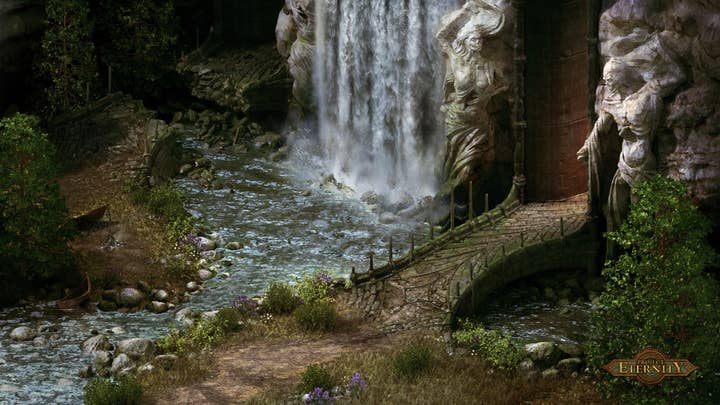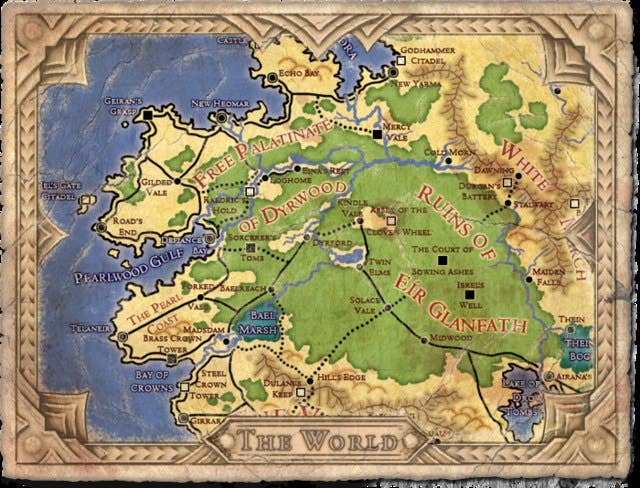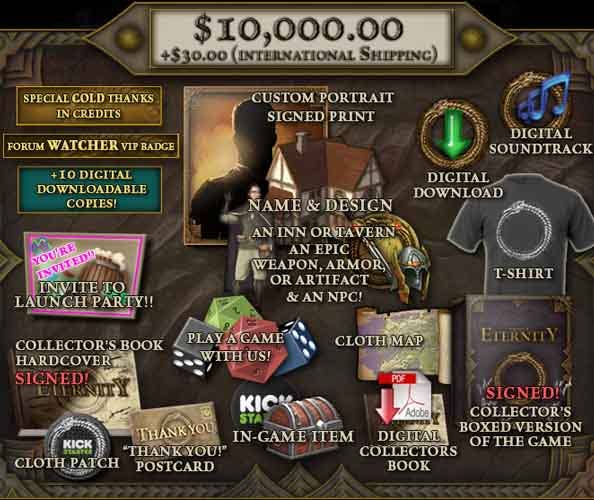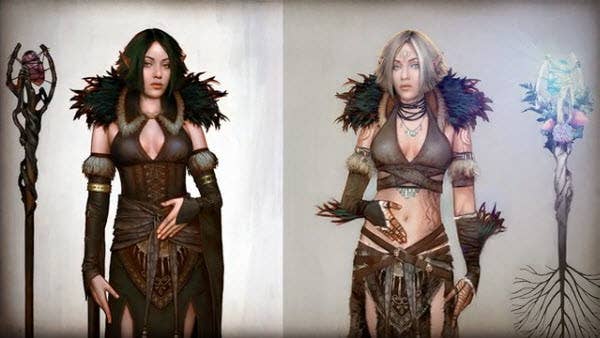Project Eternity: How Chris Avellone Blew By $4 Million on Kickstarter
Obsidian's Creative Director shares his secrets of success and how liberating Kickstarter has been for design
Obsidian Entertainment's Kickstarter for the Project Eternity RPG has closed, and the final totals are stunning: There are 77,667 Backers and $4,163,208 was pledged between Kickstarter and PayPal. The game will be built using Unity, and based on Obsidian's experience making numerous award-winning RPGs in the past.
Chris Avellone is the Creative Director for Obsidian Entertainment, and one of the key figures in putting together the Kickstarter campaign. GamesIndustry International spoke with Avellone as the Project Eternity Kickstarter was in its final days, to get his thoughts on the process, the design, and what it's like to work on a game design with a community of fans.
I'm not really sure how long Kickstarter will last. What we were worried about with Eternity is that it seemed like a lot of gaming companies were barely making their funding goals. Double Fine and Wasteland II charged pretty strong out of the gate. Shadowrun did pretty well, but then we noticed there's been a drop-off of how much people were willing to donate.
I'm worried about Kickstarter exhaustion; it seems like there's always a new Kickstarter project going up. That was one of the challenges we knew we had to face going into it. We had no idea if we'd make our funding goal at all, just because we'd seen that pattern developing. We're like, "Do we have enough appeal to even stand out in the crowd?" Fortunately we did.
When the first successful title hits, or even the first unsuccessful title hits, that'll change Kickstarter in different ways. We haven't really seen the upper levels of how much people are willing to donate. We were joking around about this a few months back. Joss Whedon never went up on Kickstarter and said "Hey, you know what, I started a Kickstarter to buy back the rights to Firefly." How many millions upon millions of dollars would he get for that?
Then there's the danger of when the first big failure comes out on Kickstarter, I think people will be even more hesitant about donating. It will be beyond exhaustion level; it will be "I'm not sure this process is going to pan out." I feel like Kickstarter is still in its infancy when it comes to the process; I feel like we're in the honeymoon phase.
"Kickstarter is still in its infancy when it comes to the process"
Chris Avellone
It's a better way to make a project; there's a lot of logistical issues you solve by doing that. Sometimes it's really difficult to predict what players don't want. Wasteland II, for example was mentioning they could potentially have a social aspect to the game; the players quickly wrote back and said "That's not important to us." They said "Having a lot of voice-over work in the game is not important to us either."
They don't care about that stuff, and if you know that in the first thirty days, you save so much time and so much resource you would otherwise just be pissing away. That flows down to design stuff, too. We get a lot of feedback on the forums for classes or elements they might want to see in the game; that sounds cool to us, too, but now that we can actually have a dialog with them about it and we can poll their opinions and get an idea. We would love to do stuff like that to make them happy. That works out great for us.
Our hope with Eternity is that it's just the first in a series of installments, and then obviously we want to do the full expansion packs, and then extra content, just because we know we really enjoyed doing that for Fallout: New Vegas. We'd want to continue adding new content to the world. The first game is only one moderately sized nation in a much, much, much bigger world where a lot of other things are going on. There's plenty more room for games in that universe and that's what we'd like to do.
It's kind of nice because not all of that has to be done in the games; we can go out and look for graphic novel tie-ins and novel tie-ins and stuff. It is kind of cool to be able to pursue that on our own without having to go through a publisher, or accept the fact that whatever franchise we're with already has the avenues all covered. It's such a nice feeling.

All I care about is the roleplaying and then the writing for comics and books. That's exciting enough for me. Though there are probably guys at the office who'd be excited at the idea of action figures, because when little Darth Nihilus figures started coming out from Knights of the Old Republic II, all the guys who designed him were like "I finally made a character that's been turned into an action figure!"
There will always be other realities, though. If we were going to distribute in Germany we would have to obey their laws about game content; we'd have to figure that out. In terms of subjects that are normally considered to set people off, whether they do or not, we're not worried about that anymore, and it's really freeing. I think the public's a lot more understanding if it's presented in a mature way.
We did this one DLC called Honest Hearts, and the project director for that was really worried. "The main character in this has a pretty personal religious take, and that could be pretty sensitive to some people," he said. People were fine with it; they said the presentation was handled in a mature way, and it wasn't flippant or derogatory. I think we're good about executing themes like that and making them interesting and hopefully give people something to think about.
"In terms of subjects that are normally considered to set people off, we're not worried about that anymore"
Chris Avellone
That's a very difficult question. Would I want to know if I purchased a game for my son or daughter, if the game had elements like that in it before I purchased it? Yes, absolutely. I'm not sure what the best means of communicating that is. I would like to think that the aesthetic approach that you mentioned, based on the cover art, the back cover of the book, it's pretty clear it's going to be a mature experience. I would prefer that as long as we could count on that. I'd like to think that our artists and our presentation could do that, but I'm speaking as a single guy with no family.
I don't think we're approaching it in the sense of purposefully trying to create anything disturbing. We did sit down and discuss a lot of themes we wanted to explore that normally we couldn't. Hopefully we can talk more about that in the coming months. We didn't approach it like "Here's how we're going to shock people," but it was more like '"Here's something we've always wanted to talk about" and we couldn't for whatever reason, like it was a franchise it wasn't appropriate for. I'm done with that discussion and now we don't have to have it anymore.

There's been a lot of focus with companion mechanics in terms of like "how do I romance this person?" I'd like to think that there are other types of relationships that you can have with a companion, whether it's friendship, rivalry, hatred, or revenge. Romances end up being an easy target, but I think there's a lot more you can do with companion relationships. Also, I think a lot of games have fallen into the hole of the evil choice is always a psychotic option. There's a whole spectrum of other stuff you can do in conversation that I'm looking forward to doing. Sometimes depending on the franchise it does make sense that you have these really extreme morality bars, because that's the nature of the franchise.
With this world I think it's going to be a little bit more subtle. The whole premise of the lore and the magic system is that souls get inherited, and then when you pass away the souls wait for a time and then come back to another body. The question is how much of your own behavior is being governed by your own free will or the influence of the soul inside you and all of its history? I think that can raise some interesting questions for both the player character and the companions.
I have no idea. I don't know if they care. The budgets for these things are so small in comparison to budgets that we normally talk about with publishers, it seems almost like it would be shrugworthy. When we're pitching projects that are $20 or $25 million, getting $2.5 million doesn't register on the radar. We're also doing the type of games that they generally don't do. We're not even really competing per se. They always have the voice-overs and the bells and whistles, like you have to push the physics engine and the art engine with all of their stuff, because they're targeting a much different audience than the small selected target that we're doing with our games. The Wasteland II target isn't necessarily the same thing as the Call of Duty target, obviously, and there's always going to be Call of Duty games funded by publishers.
I'd like to think publishers think that there's value in seeing those small games pop up, because that's where you get the really interesting new mechanics that people would be afraid to try. Publishers are spending so much money on these blockbusters that they are very hesitant to take risks, and I understand why. It makes sense because you're putting a lot of money into one of these projects, and you want to make sure there's as few x-factors as possible.
"Publishers are spending so much money on these blockbusters that they are very hesitant to take risks, and I understand why"
Chris Avellone
Don't get me wrong, I like working with franchises, and there's always something you love in every franchise. When I first started working on Star Wars, I wasn't very thrilled about it. I was like "Oh, God, really?" and a week later I'm like "Hey, I'm getting kind of revved up about this, this is pretty cool!" Sometimes when you're playing around in a franchise and digging around in the conventions that they use, that becomes part of your arsenal. When I worked on that project, here's the tone I was shooting for, and it kind of broke me out of my comfort zone, and that was kind of cool. It made me a better writer.
It's largely in pre-production. We weren't sure exactly how much resources and funding we would get for it, and that governs so many things. Once we have the final amounts back from the Kickstarter we can figure out the staff breakdowns and plot out the schedule a little bit more accurately.
One nice thing is this is a pipeline that we've done many times back at Black Isle, and we still have a lot of those same people working on it. The very first area that we're working on, the level artist for that is actually the same guy who was doing level art all the way back for Icewind Dale II. Things have come full circle, it's crazy.
It's basically crunch time.

You have to jump on that too. You can't suddenly vanish after the Kickstarter takes place. You have to have updates ready to go; not the same intensity of communication, or frequency, but let people know what's going on with updates, have somebody manning the forums, answering questions, compiling issues that people are asking about and then addressing them on a regular basis.
I talk to a lot of people about various Kickstarter projects, and one of the things they look for is 'Can we get more community support members? Do you know anybody we can hire to help out with that?' There is so much management that you have to do for tracking all the questions people have, getting back to people in the community, handling all the press stuff that comes in. A lot of Kickstarter projects aren't equipped to handle that level of traffic at that intensity. Usually they have a very, very small team, and the project itself isn't a big project, so every staff member costs - it's rough.
Well, a certain percentage you might want to do that, because I think there are two advantages to doing that. One is, I think it's always good for any particular developer to interface directly with the community and see what they're talking about. It also ends up being morale boosting, in the sense that programmers don't often get the chance to talk with the community; publishers don't often throw a programmer out there and discuss those things. Now we can, and I think it's good for any programmer that wants to do that. One of our AI guys, Steve Weatherly, he's actually been our main contact guy through Reddit and getting that whole process organized, and he's been out there talking to people. He's really happy doing it, and he never had an opportunity to do something like that before. For people that want to do that I'd like to give them that opportunity because I think it keeps them grounded.
"If someone had told me we would hit $4 million, I wouldn't have believed them"
Chris Avellone
Yeah, but I think a lot of the folks that we have are pretty level-headed. I'll be honest, over time we're going to say something wrong, but at the same time I don't feel like it's going to get the god-hammer coming down from the publisher to obliterate us. If it ends up being wrong in the sense that the players didn't like the decision, or they didn't like some aspect of the design, then at least you know it and it's out there and you can fix it. As opposed to finding out in the six months before release, when changing it is going to be pretty expensive at that point, even if they do want it. Fortunately those instances have been pretty rare for us, but I hear horror stories.
One of the craziest things is a bunch of fans started this Order of Eternity, and we're like what is this? Apparently anyone can join as long as you up your pledge by $8. We're like, why 8? Oh it's the infinity symbol sideways; "Let's all return to the Infinity Engine." They've got their own web site, and theme music, and the art director actually made special Avatar 8 icons so when they show up in the forums they have their own special icon. To see them rally around Kickstarter like that was pretty crazy. I've seen guilds being built in games, but the fact that there's a guild being built for a Kickstarter is just crazy.
One thing we noticed both on Eternity and Wasteland II is once the engine was announced, the amount of volunteers that poured in going "I do environment art in Unity in my spare time, I really enjoy doing it, could I send you a sample?" and then going back and forth with those guys. The Wasteland II guys found this guy in South Africa who is just doing a fantastic job laying out maps in Unity.
That feels like a rare option in the industry, the amount of people willing to just come on board and just pitch in because they know the engine and the technology. We've had programmers, artists, and people who do metrics analysis using Unity plug-ins. It's been really interesting and kind of gratifying.
Yes. The video, and knowing how important the FAQ really is, and how many times you should state and restate your point, and how frequently you do updates and what type of updates you want to do... Our poor art director has been going through the coals trying to keep up with the graphics and the images and the art and the stretch goals. I said, "Rob, I don't understand why you're still standing right now." Everyone's to the grindstone.
Prepare. Fargo did a really smart thing by having a whole bunch of news about the project before he launched the Kickstarter. Then he was really good about contacting the press outlets, going "On day 1 we're going to have the following exclusive interviews," and then he made sure throughout the process that he'd always be announcing something every day that would be hitting the headlines. Which was good, because I think Brian was getting exhausted trying to handle all the interviews, largely by himself.
If someone had told me we would hit $4 million, I wouldn't have believed them. Even if that someone was a future version of me that had traveled back in time, grabbed me by the shoulders, and said "I have seen it with my own eyes."

